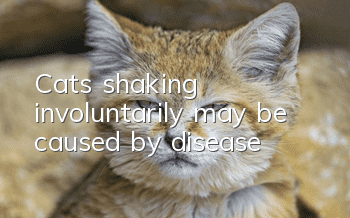Cats shaking involuntarily may be caused by disease

If a cat shivers involuntarily, it may not be because of cold, but because of illness. What is involuntary trembling? Involuntary muscle tremors, also known as fasciculations, describe uncontrolled shaking, twitching, or spasm of muscles. This condition can also happen to cats and other animals for various reasons. Sometimes, tremors may be caused by genetic factors or cold weather, cannot be improved, and have no impact on health. However, tremors can also be symptoms of a disease, which can be life-threatening in severe cases. When a cat’s body continues to tremble, we should pay attention.
Causes of tremors in cats
1. Trembling all over
· Hypoglycemia
When a cat does not eat for a long time, its blood sugar will drop, causing hypoglycemia. Low blood sugar can also occur when you have digestive problems such as vomiting, diarrhea, or constipation. There are also some cats with anorexia that refuse to eat because they are irritable or uncomfortable, causing their bodies to tremble.
· Fever
When cats have a high fever, they will start shivering because of chills. Their normal body temperature is between 38-39.5°C. If it is higher than 39.5°C, it means they have a fever. Viral infections caused by high fever may cause them to shive uncontrollably. Therefore, when a cat’s ears or flesh balls are overheated, we should test their body temperature in time to avoid shivering caused by high fever.
· Hypothermia
Most healthy adult cats have no problem maintaining their body temperature, but kittens, especially newborn cats, are unable to maintain their own body temperature and may develop hypothermia using a heating pad or other means of warmth. Warmth is very important.
· Poisoning
Cats are curious animals. They may inadvertently come into contact with poisonous plants, chemicals or other toxic substances, which may cause tremors and vomiting. In this case, they should be taken to the hospital for treatment as soon as possible.
·Pain
Pain caused by a cat's illness or injury can also cause it to tremble constantly.
· Epileptic seizure
Seizures may also cause muscle tension and tremors. These seizures can occur for a variety of reasons, including heat stroke, toxicity, metabolic disease, fever, seizures, allergic reaction or overdose.
·Shock
Shock may also trigger shaking and shaking in cats. Shock can occur due to serious illness following an accident or trauma. Other signs of shock include cold extremities, pale gums, weakness, and a rapid heart rate.
· Ear problems
Head shaking and scratching at the ears are common signs of ear problems. It is most likely caused by infection, such as bacteria, yeast and/mites (you can use cotton wool/paper towel to pick out the ear for further judgment).
· Sleep
When a cat is sleeping, because it is completely relaxed, it is likely to have brief twitches, which usually last for 6-8 minutes, intermittently.
· Fear
A phobia is a persistent and excessive fear of a specific stimulus, such as fireworks. Excessive anxiety responses are characteristic of phobia symptoms, and it has been shown that once a phobic event is experienced, any events associated with it or memories of it are sufficient to produce a response. The most common phobias are related to noises such as fireworks or thunderstorms.
· Pressure
Cats are sensitive animals, and it is difficult to find out what problems are causing them trouble. Changes in the environment, noise outside the window, and the owner's going out may cause the cat to have an emotional outburst, and may even start to act involuntarily due to nervousness or anxiety. Trembling. First, we should conduct a physical examination to rule out possible physical diseases, and then try other methods that can make the cat happy and relieve their stress.
2. Local tremor
· Head shaking
Cats' heads usually do not tremble in a conscious state, and their ears and mouth are not part of the entire head. When they do very exciting exercises, they may cause epileptic seizures, causing the body to twitch. Epileptic seizures are caused by abnormal function of a certain area of the brain, especially the cerebral cortex.
· Leg tremors
This is a rare tremor site that may cause spasms due to calcium deficiency. It may also be nerve paralysis caused by fracture, arthritis or other leg diseases. The inside of the ankle is bent and cannot return to a straightened state, so the cat feels weak in the leg, causing tremors.shake.
If your cat trembles for a long time or trembles too frequently, and is accompanied by loss of appetite, vomiting, diarrhea or other complications, please go to the hospital immediately. The doctor usually conducts an in-depth physical examination to determine the cat’s condition. The source of trembling.
In addition, remember to observe some behavioral changes of cats in daily life, which is very useful when the doctor consults.
Diagnosing tremors in cats
In all cases, a complete blood count (CBC), biochemical analysis, and urinalysis are recommended. It is important to rule out metabolic disorders such as hypoglycemia (low blood sugar) or kidney disease. Creatine kinase is included to assess the possibility of muscle disease.
· Screening chest and abdominal radiographs (X-rays) are usually within normal limits, and in some cases, spine radiographs may be recommended.
· Myelography (the use of dye to study the spine) may be recommended to assess the presence of tumors or disc disease.
· CT (computed tomography) scan/MRI (magnetic resonance imaging) will help detect structural changes in the brain and/or spine.
· Cerebrospinal fluid (CSF) can confirm encephalitis.
· Electromyography (EMG) will help diagnose related neuromuscular diseases.
How to treat and stop tremors
Since tremor is really just the result of an underlying disease, the main goal of treatment is to target and treat the disease itself.
If the tremor is caused by drugs, usually the doctor will recommend an alternative drug to prevent the tremor; if it is suspected that the tremor is caused by a certain toxin, the doctor will usually clean the stomach first after asking about the recent daily diet. Prescribe the right medicine according to the current physical condition of the cat, while supplementing the nutrients the body needs. If the tremor is related to a neurological disorder, surgery may be used to treat the primary neurological disorder, and to control the tremor, the doctor may recommend the use of medications to control the chicken's movement.
Tremors in sleeping cats are mostly caused by over-excitement or fatigue. When interacting with cats, it is recommended to slightly control the amount of exercise and avoid over-exertion.
In addition, it is worth noting that recovery from conditions that cause tremors in cats depends mostly on the successful treatment of the underlying disease. Although most diseases can be cured, parents still need to pay more attention to the cat's diet and activities during treatment. Please communicate with your doctor promptly and conduct regular check-ups.
Recommended Good Things
Aineng Pet Odor Eliminating Disinfectant can effectively remove body odor/feces odor and other odor molecules! Effective in treating skin diseases caused by fungi/bacteria! Can kill parvovirus/canine distemper virus/coronavirusetc!
It is edible grade for pets, does not contain fragrances, does not contain chemicals, can be sprayed directly, and is harmless to human pets!
Consultation: 13028809308 (WeChat synchronization)
Scan the QR code on WeChat to enter the purchase
- What harm does durian do to cats?
- Answers to frequently asked questions about cat deworming, for novice cat owners, take a look!
- How to train a cat to use the toilet
- How to feed the milk cat at night
- Why does a cat’s tongue have spines?
- What's the use of trimming a cat's nails?
- What medicine should be used when cats have mite symptoms on their skin?
- Can one-month-old kittens drink yogurt?
- What vaccines can cats get?
- Kittens can have their nails trimmed starting from a few months old



